| Listing 1 - 10 of 11 | << page >> |
Sort by
|
Book
ISBN: 0674060814 9780674060814 9780674058743 0674058747 Year: 2011 Publisher: Cambridge, Mass : Harvard University Press,
Abstract | Keywords | Export | Availability | Bookmark
 Loading...
Loading...Choose an application
- Reference Manager
- EndNote
- RefWorks (Direct export to RefWorks)
Political constitutions, hammered out by imperfect human beings in periods of intense political controversy, are always compromises with injustice. What makes the U.S. Constitution legitimate, argues this daring book, is Americans' enduring faith that the Constitution's promises can someday be redeemed, and the constitutional system be made "a more perfect union."A leading constitutional theorist, Balkin argues eloquently that the American constitutional project is based in faith, hope, and a narrative of shared redemption. Our belief that the Constitution will deliver us from evil shows in the stories we tell one another about where our country came from and where it is headed, and in the way we use these historical touchstones to justify our fervent (and opposed) political creeds. Because Americans have believed in a story of constitutional redemption, we have assumed the right to decide for ourselves what the Constitution means, and have worked to persuade others to set it on the right path. As a result, constitutional principles have often shifted dramatically over time. They are, in fact, often political compromises in disguise.What will such a Constitution become? We cannot know. But our belief in the legitimacy of the Constitution requires a leap of faith-a gamble on the ultimate vindication of a political project that has already survived many follies and near-catastrophes, and whose destiny is still over the horizon.
Book
ISBN: 0674063031 9780674063037 9780674061781 0674061780 Year: 2011 Publisher: Cambridge, Mass. : Harvard University Press,
Abstract | Keywords | Export | Availability | Bookmark
 Loading...
Loading...Choose an application
- Reference Manager
- EndNote
- RefWorks (Direct export to RefWorks)
Originalism and living constitutionalism, so often understood to be diametrically opposing views of our nation's founding document, are not in conflict-they are compatible. So argues Jack Balkin, one of the leading constitutional scholars of our time, in this long-awaited book. Step by step, Balkin gracefully outlines a constitutional theory that demonstrates why modern conceptions of civil rights and civil liberties, and the modern state's protection of national security, health, safety, and the environment, are fully consistent with the Constitution's original meaning. And he shows how both liberals and conservatives, working through political parties and social movements, play important roles in the ongoing project of constitutional construction. By making firm rules but also deliberately incorporating flexible standards and abstract principles, the Constitution's authors constructed a framework for politics on which later generations could build. Americans have taken up this task, producing institutions and doctrines that flesh out the Constitution's text and principles. Balkin's analysis offers a way past the angry polemics of our era, a deepened understanding of the Constitution that is at once originalist and living constitutionalist, and a vision that allows all Americans to reclaim the Constitution as their own.
Constitutional law --- Law --- Origin (Philosophy) --- Philosophy --- Philosophy. --- Interpretation and construction.
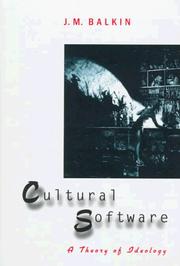
ISBN: 0585382506 9780585382500 0300072880 9780300072884 0300084501 9780300084504 Year: 1998 Publisher: New Haven : Yale University Press,
Abstract | Keywords | Export | Availability | Bookmark
 Loading...
Loading...Choose an application
- Reference Manager
- EndNote
- RefWorks (Direct export to RefWorks)
In this book J.M. Balkin offers original theory of cultural evolution, a theory that explains shared understandings, disagreement, and diversity within cultures. Drawing on many fields of study - including anthropology, evolutionary theory, cognitive science, linguistics, sociology, political theory, philosophy, social psychology, and law - the author explores how cultures grow and spread, how shared understandings arise, and how people of different cultures can understand and evaluate each other's views. Balkin presents numerous examples that illuminate the sources of ideological effects and their contributions to injustice. He also enters the current debate over multiculturalism, applying his theory to problems of mutual understanding between people who hold different worldviews. He argues that cultural understanding presupposes transcendent ideals and shows how both ideological analysis of others and ideological self-criticism are possible.
Ideology. --- Culture. --- Social values. --- Justice. --- Ideology --- Culture --- Social values --- Justice --- Philosophy & Religion --- Philosophy --- Injustice --- Conduct of life --- Law --- Common good --- Fairness --- Values --- Cultural sociology --- Sociology of culture --- Civilization --- Popular culture --- Knowledge, Theory of --- Political science --- Psychology --- Thought and thinking --- Social aspects --- Discourse --- #SBIB:316.7c122 --- 316.7 --- 316.7 Cultuursociologie --(algemeen) --- Cultuursociologie --(algemeen)
Book
ISBN: 0300255780 Year: 2020 Publisher: New Haven, Connecticut ; London, England : Yale University Press,
Abstract | Keywords | Export | Availability | Bookmark
 Loading...
Loading...Choose an application
- Reference Manager
- EndNote
- RefWorks (Direct export to RefWorks)
Rewriting the Supreme Court's landmark gay rights decision Jack Balkin and an all-star cast of legal scholars, sitting as a hypothetical Supreme Court, rewrite the famous 2015 opinion in Obergefell v. Hodges, which guaranteed same-sex couples the right to marry. In eleven incisive opinions, the authors offer the best constitutional arguments for and against the right to same-sex marriage, and debate what Obergefell should mean for the future. In addition to serving as Chief Justice of this imaginary court, Balkin provides a critical introduction to the case. He recounts the story of the gay rights litigation that led to Obergefell, and he explains how courts respond to political mobilizations for new rights claims.
Gay couples --- Same-sex marriage --- Legal status, laws, etc. --- Law and legislation --- Obergefell, James --- Obergefell, James. --- Trials, litigation, etc. --- United States.
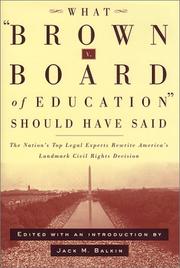
ISBN: 0814723047 0585434700 9780585434704 9780814798898 0814798896 9780814723043 0814798896 081479890X Year: 2001 Publisher: New York : New York University Press,
Abstract | Keywords | Export | Availability | Bookmark
 Loading...
Loading...Choose an application
- Reference Manager
- EndNote
- RefWorks (Direct export to RefWorks)
Brown v. Board of Education, the Supreme Court's landmark 1954 decision ordering the desegregation of America's public schools, is perhaps the most famous case in American constitutional law. Criticized and even openly defied when first handed down, in half a century Brown has become a venerated symbol of equality and civil rights. Its meaning, however, remains as contested as the case is celebrated. In the decades since the original decision, constitutional interpreters of all stripes have found within it different meanings. Both supporters and opponents of affirmative action have claimed the mantle of Brown, criticizing the other side for betraying its spirit. Meanwhile, the opinion itself has often been criticized as bland and uninspiring, carefully written to avoid controversy and maintain unanimity among the Justices. As the 50th anniversary of Brown approaches, America's schools are increasingly divided by race and class. Liberals and conservatives alike harbor profound regrets about the development of race relations since Brown, while disagreeing heatedly about the proper role of the courts in promoting civil equality and civil rights. In this volume, nine of America's top constitutional and civil rights experts have been challenged to rewrite the Brown decision as they would like it to have been written, incorporating what they now know about the subsequent history of the United States but making use of only those sources available at the time of the original decision. In addition, Jack Balkin gives a detailed introduction to the case, chronicling the history of the litigation in Brown, and explaining the current debates over its legacy. Contributors include: Bruce Ackerman, Jack M Balkin, Derrick A. Bell, Drew S. Days, John Hart Ely, Catharine A. MacKinnon, Michael W. McConnell, Frank I Michelman, and Cass R. Sunstein.
Discrimination in education --- Segregation in education --- Educational discrimination --- Race discrimination in education --- Education --- Affirmative action programs in education --- Law and legislation --- History. --- Brown, Oliver, --- Brown, Oliver Leon, --- Trials, litigation, etc. --- Topeka (Kan.). --- Board of Education of Topeka --- Americas. --- case. --- changed. --- country. --- court. --- esteemed. --- legal. --- most. --- that. --- voices. --- weigh.
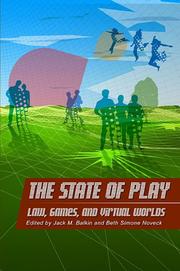
ISBN: 0814739075 9780814739075 081479971X 0814799728 9780814799710 9780814799727 Year: 2006 Publisher: New York : New York University Press,
Abstract | Keywords | Export | Availability | Bookmark
 Loading...
Loading...Choose an application
- Reference Manager
- EndNote
- RefWorks (Direct export to RefWorks)
The State of Play presents an essential first step in understanding how new digital worlds will change the future of our universe. Millions of people around the world inhabit virtual words: multiplayer online games where characters live, love, buy, trade, cheat, steal, and have every possible kind of adventure. Far more complicated and sophisticated than early video games, people now spend countless hours in virtual universes like Second Life and Star Wars Galaxies not to shoot space invaders but to create new identities, fall in love, build cities, make rules, and break them.As digital worlds become increasingly powerful and lifelike, people will employ them for countless real-world purposes, including commerce, education, medicine, law enforcement, and military training. Inevitably, real-world law will regulate them. But should virtual worlds be fully integrated into our real-world legal system or should they be treated as separate jurisdictions with their own forms of dispute resolution? What rules should govern virtual communities? Should the law step in to protect property rights when virtual items are destroyed or stolen?These questions, and many more, are considered in The State of Play, where legal experts, game designers, and policymakers explore the boundaries of free speech, intellectual property, and creativity in virtual worlds. The essays explore both the emergence of law in multiplayer online games and how we can use virtual worlds to study real-world social interactions and test real-world laws.Contributors include: Jack M. Balkin, Richard A. Bartle, Yochai Benkler, Caroline Bradley, Edward Castronova, Susan P. Crawford, Julian Dibbell, A. Michael Froomkin, James Grimmelmann, David R. Johnson, Dan Hunter, Raph Koster, F. Gregory Lastowka, Beth Simone Noveck, Cory Ondrejka, Tracy Spaight, and Tal Zarsky.
Computer games --- Virtual reality. --- Environments, Virtual --- Virtual environments --- Virtual worlds --- Computer simulation --- Reality --- Law and legislation. --- Juridische aspecten --- Virtuele werkelijkheid --- Computerspellen --- Recht --- Computerspiel --- Realite virtuelle. --- Jeux d'ordinateur --- Droit. --- Réalité virtuelle --- Droit --- Law and legislation --- Video games --- Presents. --- change. --- digital. --- essential. --- first. --- future. --- step. --- understanding. --- universe. --- will. --- worlds. --- Virtual reality

ISBN: 9780814799703 0814799701 9780814799833 0814799833 0814739334 Year: 2007 Publisher: New York : New York University Press,
Abstract | Keywords | Export | Availability | Bookmark
 Loading...
Loading...Choose an application
- Reference Manager
- EndNote
- RefWorks (Direct export to RefWorks)
"National security increasingly depends on computer security. Cybercrime is written by the leading academic experts and government officials who team together to present a state-of-the-art vision for how to detect and prevent digital crime, creating the blueprint for how to police the dangerous back alleys of the global Internet."-Peter P. Swire, C. William O'Neill Professor of Law, the Ohio State University, and former Chief Counselor for Privacy, U.S. Office of Management & Budget. The Internet has dramatically altered the landscape of crime and national security, creating new threats, such as identity theft, computer viruses, and cyberattacks. Moreover, because cybercrimes are not often limited to a single site or national border, crime scenes themselves have changed. Consequently, law enforcement itself must confront these new dangers and embrace novel methods of prevention, as well as produce new tools for digital surveillance - which can jeopardize privacy and civil liberties. Cybercrime brings together leading experts in law, criminal justice, and security studies to describe crime prevention and security protection in the electronic age. Ranging from new government requirements that facilitate spying to new methods of digital proof, the book is essential to understand how criminal law-and even crime itself-have been transformed in our networked world.
Computer crimes --- Internet --- Computer security --- Criminalité informatique --- Sécurité informatique --- Prevention --- Law and legislation --- Evaluation --- Prévention --- Droit --- Prevention. --- Evaluation. --- Criminalité informatique --- Sécurité informatique --- Prévention --- Computer privacy --- Computer system security --- Computer systems --- Computers --- Cyber security --- Cybersecurity --- Electronic digital computers --- Protection of computer systems --- Security of computer systems --- Data protection --- Security systems --- Hacking --- Protection --- Security measures
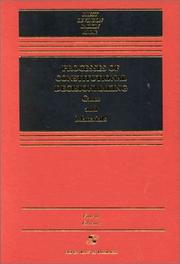
ISBN: 0735512507 Year: 2000 Publisher: New York (N.Y.) Aspen Law & Business
Abstract | Keywords | Export | Availability | Bookmark
 Loading...
Loading...Choose an application
- Reference Manager
- EndNote
- RefWorks (Direct export to RefWorks)
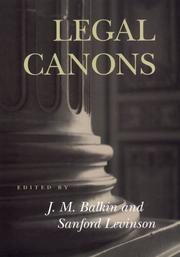
ISBN: 0585424853 0814709036 0814798578 Year: 2000 Publisher: NYU Press
Abstract | Keywords | Export | Availability | Bookmark
 Loading...
Loading...Choose an application
- Reference Manager
- EndNote
- RefWorks (Direct export to RefWorks)


ISBN: 9780814709030 9780814798577 Year: 2000 Publisher: New York, N.Y. New York University Press
Abstract | Keywords | Export | Availability | Bookmark
 Loading...
Loading...Choose an application
- Reference Manager
- EndNote
- RefWorks (Direct export to RefWorks)
| Listing 1 - 10 of 11 | << page >> |
Sort by
|

 Search
Search Feedback
Feedback About UniCat
About UniCat  Help
Help News
News